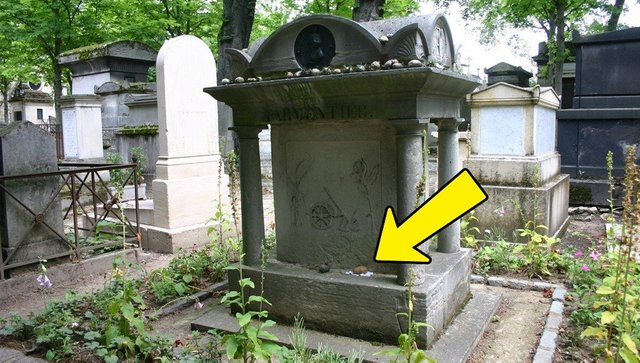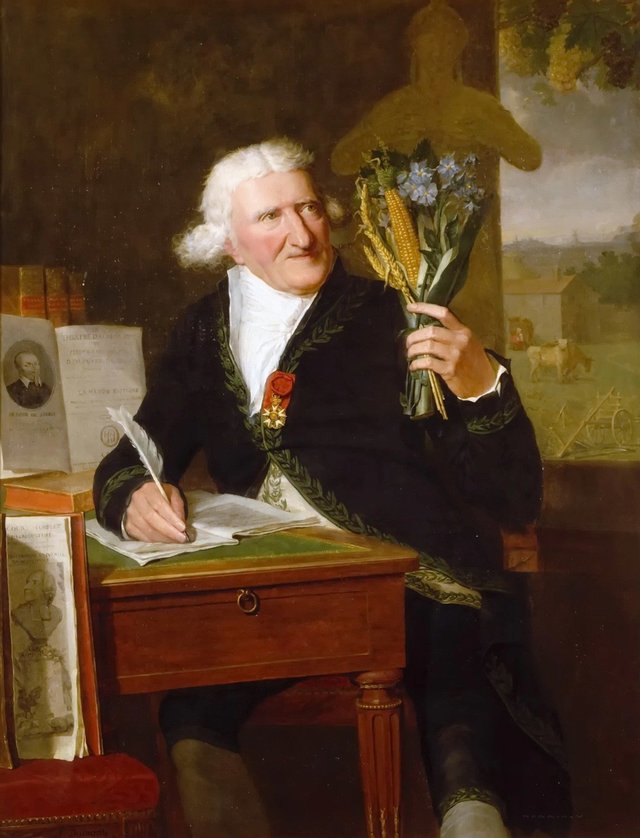Why have the French put potatoes on the grave of this agricultural engineer since the nineteenth century?
(Antoine Augustin Parmontieri) was one of the most ardent enthusiasts of potatoes, as myths describe him as the inventor of fried potatoes.

When you stroll around the Bir Laches Cemetery in Paris where the graves of many famous people such as American singer (Jim Morrison) are located, you may encounter a grave covered with potatoes and engraved with the following words: Merci Pour Les Frites which means “thanks for the french fries”, This is the tomb (Antoine Augustin Parmonte), and despite what is written on his grave, the truth is that he is not the inventor of the fried potatoes, and yet he had a very big role in making fried potatoes a major part of French food as it is today.
Although potatoes are a major ingredient in western cuisine today and many famous foods are prepared such as French fries - which are really of Belgian origin even though their English name is French Fries - and traditional Spanish potato meals, and the famous French meal "potato porridge" However, it did not become part of the European diet until the Spanish arrived in southern Peru in the 1830s.
The Spaniards began eating potatoes first and then the English, and within a short period of time most of the people of the continent of Europe ate potatoes especially during periods of famine, but things were different and more cruel to potatoes in France, although the French used to grow potatoes as food for pigs, but they did not acquire the same The popularity it gained in neighboring countries, so that the monarchy banned it for 20 years during the eighteenth century, due to rumors saying that eating potatoes may lead to leprosy or even plague.

Personal portrait of (Antoine Augustine Parmontieri).
Image: Fine Art Images / Heritage Images / Getty Images
These rumors, in addition to the vegetable link between the potatoes and the poisonous belladonna plant - the plant of Six Hassan - caused many to question the potato when it was introduced to Europe, where all these rumors prevented the potato from becoming popular among the French, even the hungry poor.
Here (Antoine Parmontieri) enters, a pharmacist does not have the money to open his own pharmacy, so he decides to provide his services to the French army, and during the seven years war, (Antoine) was captured and imprisoned in Prussia, where he discovered the humble potatoes. Food, especially after stopping the import of cereals from France, and during his prison period, the potatoes served gi regularly, and there he discovered that they were not only delicious, but did not cause him leprosy or plague.
After he was released, (Antoine) returned to France and he intends to spread what he knew about potatoes among the French, but the French are known to be resisting the change, even the Eiffel Tower which is now the symbol of the capital Paris has been described by the French as being harmful for years, so it was Naturally, the potatoes that many French believed were not only harmful to human health but also to the health of agriculture - where many thought they were absorbing nutrients from the soil - would need a lot of marketing to get their attention.
So (Antoine) had to be creative, and he offered bouquets of potato flowers to each of King (Louis XVI), who placed flowers on his clothes and Queen (Marie Antoinette) who placed a bouquet of flowers on her hair, just as King (Louis) allowed Antoine would have planted a field of potatoes not far from the French capital.
After planting the potatoes, Antoine hired soldiers to protect the field, but he gave them a break during the night and then encouraged the poor locals to steal the potatoes in the middle of the night, which contributed to the rise in popularity, and at the same time was making his way through the notorious French bureaucracy With the aim of repairing the potato's reputation.
In 1771 (Antoine) won a prize launched by the Academy (Pensisson) to find food capable of feeding the poor during periods of famine, and in 1772 the Faculty of Medicine of the University of Paris declared edible potatoes, and the potatoes actually helped the French to survive the scarcity prevalent during the years that Prior to the outbreak of the French Revolution in 1789.
But potatoes did not become popular among the poor only. In 1783 (Antoine) held a dinner that included 20 different dishes whose main consistency is potatoes, and since both Benjamin Franklin and Thomas Jefferson were among the attendees, many credit the dinner. However, it is the way that French fries came to the United States of America, where (Jefferson) was the first to introduce french fries in the White House.
Antoine’s march led to the popularity of many foods in France such as chestnut and corn, but his name remains more closely associated with potatoes. During many years, many people tried to name potatoes that the French called “Pomme de Terre” on his name.
Although this honor was not achieved, many French dishes that include potatoes contain in its name a reference to it such as the Hachis Parmentier dish and the Pommes Parmentier dish, and if you ever get the chance to visit this interesting person's grave, you will find a patch of potatoes surrounding it, But this particular potato is definitely not recommended for eating.